Podcast: Download (Duration: 47:01 — 43.8MB)
Get Notified Of Future Episodes Apple Podcasts | Spotify | Amazon Music | Android | Blubrry | Gaana | TuneIn | Deezer | Anghami | RSS | More
In episode 1046 of his podcast, James Schramko welcomes marketing expert and many-time guest Will Wang to discuss some highly profitable email marketing ideas.
They touch on the journey from using cold emails to build a database to the crucial next steps—what to actually send to warm leads and existing database subscribers to encourage action, bookings, and ultimately sales.
They’ll talk about the role of an email marketing newsletter, and highlight the importance of nurture emails.
And they’ll look at the power of the 9 word email devised by Dean Jackson – potentially the million-dollar email of this episode’s title.
Table of contents
1. You’re building a list, why?
2. Chasing the phone call
3. The things that keep people from taking action
-
A. 1 – The fight for attention
B. 2 – How to get people to trust you
C. Things that break and build trust
D. 3 – Working to counter doubt
E. 4 – Where comfort can cost you
F. 5 – How you perceive and fear failure
4. Lead gen engines for small businesses
5. Choosing your lead magnet
6. The seven-email sequence
-
A. 1 – Giving what you promise
B. 2 – Did you get the email/video?
C. 3, 4, 5 – Case studies and stories
D. When sales get unethical…
E. 6 – Where you start asking for things
F. 7 – Guiding them on the journey
7. When to send your newsletter
8. Other emails you might send
9. The importance of content quality
10. Where automation has a place
11. Thoughts to close the episode
You’re building a list, why?
Before crafting an email says Will, it’s crucial to understand the strategy behind it. The key lies in understanding why someone has opted into your email list in the first place.
By aligning the reasons for their subscription with the end goal—be it a phone call or a purchase—you can tailor your emails to bridge the gap between the initial opt-in and the final desired action.
This approach ensures that the emails sent are targeted and meaningful, leading to better conversion rates.
Chasing the phone call
James and Will discuss the importance of phone calls in selling high-ticket items, especially for smaller operations and service providers like coaches or those offering web or traffic campaigns.
They note that while products or services under $1,000 can potentially be sold with strong copy alone, items over $1,000 typically require more personal interaction, such as messaging or Zoom calls, to build trust and provide certainty to the buyer.
Simply having a lead magnet followed by a booking form is generally not effective in securing phone calls, says Will. He stresses the need for establishing trust beyond the lead magnet. To do this, the content offered must align closely with the end service, ensuring relevance and leverage.
The things that keep people from taking action
Will speaks of the psychological barriers that prevent leads from taking action, even after they’ve shown interest by opting in for a lead magnet.
There are multiple factors, says Will, that can inhibit a lead’s progression to the next step, be it a phone call or a purchase, and these must be addressed through nurturing emails and content .
1 – The fight for attention
It’s a real challenge, says Will, to capture attention in the crowded digital landscape – even if someone opts in for a lead magnet, say a 50-page eBook, they might not read it due to time constraints or lack of patience.
The content must be concise and engaging to quickly hook the reader amidst the many distractions of life.
James agrees – even with valuable and easy-to-digest content like his book, there is a need to nudge the reader towards engagement.
2 – How to get people to trust you?
The next factor is trust. This must be built through email communication, with emails that demonstrate credibility and reassure subscribers that following the advice given will yield results.
James and Will acknowledge that subscribers may not have immediate trust, and this is a significant barrier that needs to be overcome.
James shares a tactic for building trust: sending a follow-up email to confirm receipt of a book or lead magnet. This not only ensures that the subscriber has received what they signed up for, but also encourages a reply, which helps with email deliverability and shows the subscriber that the sender cares about their experience.
Will agrees, noting that his first two emails in any nurture sequence serve a similar purpose.
Things that break and build trust
James and Will both criticize the use of ‘noreply’ email addresses in business communication, arguing that it breaks trust by sending the message that customer responses are not valued.
James finds it counterintuitive to invest in ads to acquire leads only to shut down the line of communication, and Will underscores the importance of conversation, whether by phone or email, for building trust.
Will adds that real engagement with clients provides invaluable insights into their needs and aspirations, which is essential for effective marketing.
While automation may seem advanced to beginners, says James, the more seasoned marketers understand the value of personal, manual interaction. Personalized responses, like the videos Will records for each new lead, may not be scalable but they make the audience feel valued and contribute to building trust, especially in uncertain times when businesses are tempted to shortcut lead generation with automation.
3 – Working to counter doubt
Will identifies doubt as the third major barrier to engagement in email marketing, particularly in sophisticated markets where customers may have had negative experiences with competitors.
Will suggests that overcoming doubt is closely related to building trust and that using social proof in emails is an effective strategy to address this challenge, aiming to resolve enough doubt to prompt the next action from potential customers.
4 – Where comfort can cost you
The next hurdle, comfort, is a significant obstacle to customer action. Inaction, rather than competition, Will says,is often the biggest challenge for service businesses. To overcome this, businesses must address the cost of comfort and encourage leads to move beyond their current state of contentment.
5 – How you perceive and fear failure
The fifth and sixth barriers in email marketing are intertwined – issues of perception and the fear of failure. Will says the anxiety surrounding potential failure and the risk involved, as well as the concern over how others will perceive a failed attempt, can prevent people from taking action.
James, asks if there’s a specific email to address each point, what the frequency and length of these emails are, and whether the content is directly in the email or linked to an external page like a video.
Will says there is, suggests they explore a specific plan and email sequence he’s developing, offering to share templates and checklists with listeners to help their lead generation efforts.
Lead gen engines for small businesses
At Growth Labs, says Will, their current focus is to assist small businesses in improving their lead generation, especially during challenging times. The strategy involves a shift towards offering a course or program that works closely with businesses to develop a robust lead generation engine tailored to their needs.
To attract the right audience for this initiative, Will and co. plan to create highly specific lead magnets, such as checklists, templates, or videos, that directly address the key pain points businesses face regarding lead generation. This approach ensures that the content is both relevant and practical for potential clients.
Choosing your lead magnet
James and Will delve into the various options for lead magnets, ranging from checklists and templates to quizzes and parts of a course. A/B testing of different types is highly important, says Will, to see which one not only attracts leads but also converts them into clients. One of their current tests, he shares, is of a lead generation checklist against a process-explaining video.
James stresses that the success of a lead magnet should not be judged solely on the conversion rate for opt-ins but rather on the sales rate it yields. Will agrees, adding that effectiveness varies across different industries, illustrated by a checklist that worked exceptionally well for a legal client due to specific industry and regulatory changes.
The seven-email sequence
As far as the emails that Will and his team send, they are currently working on an automated seven-email sequence.
1 – Giving what you promise
The first email, says Will, is a straightforward delivery of a promised video or document, leading subscribers to a video sales letter page where they can opt to book a call for further assistance if they’re ready.
This approach prioritizes high-value information and starts the relationship by fulfilling a promise.
James inquires about behavioral tagging to track engagement, and Will confirms they use retargeting and email automation to understand subscriber actions, such as opening emails, clicking links, or booking calls. He suggests starting simple with automation and then building out more complex triggers, such as following up with subscribers who clicked to book a call but did not complete the action, possibly due to scheduling issues.
The first email also aims to engage subscribers in a conversation by asking about their biggest lead generation challenges, inviting them to respond directly. Will highlights the value of this interaction, as he personally reads and responds to each reply, setting the stage for a dialogue right from the outset.
2 – Did you get the email/video?
The second email in the sequence, much like James mentioned earlier, is a follow-up to ensure the recipient received the email and video and to prompt them to engage with the content or open a dialogue if they have any questions. This step is crucial not just for engagement but also for fostering an ongoing conversation that can lead to nurturing a lead or prospect through their journey.
James points out that responses to this second email can also serve to uncover technical issues affecting email deliverability, such as SPF records and sender reputation. Ensuring technical optimization of emails is just as crucial for warm leads as it is for cold outreach, as any issues with delivery can directly impact revenue potential.
Will agrees, and says that investing in technical assistance to optimize emails is worthwhile. The potential revenue loss due to non-delivery, says James, is certainly good enough reason for businesses to get expert help if they find themselves landing in junk folders.
3, 4, 5 – Case studies and stories
In the third, fourth, and fifth emails of the sequence, Will incorporates case studies and stories to address potential challenges and objections that a prospect might have.
Case studies showcase relatable scenarios of doubt and skepticism from others who were once in the prospect’s position, and how they overcame these issues. This helps to build the know, like, and trust factor.
Stories are used to paint a picture of transformation, urging the reader to imagine the positive changes that could occur in their business or life from using a product or service.
The narrative continues across these emails, with each one designed to educate and provide value, using the power of storytelling to facilitate a mental and emotional journey for the reader.
Email three typically presents a case study, email four tells a compelling story, and email five offers a useful tip, possibly wrapped in another case study, continuously nurturing and adding value to the relationship.
Every email in this part of the sequence includes a call to action, though kept subtle, such as a postscript inviting the recipient to reply if they’re interested in further help.
This approach maintains a low-pressure environment, acknowledging that prospects know a call might lead to a sales conversation, and gives them the easy option to simply reply to the email to initiate further dialogue.
When sales get unethical…
James criticizes unethical sales practices in the industry, such as disguising sales calls as strategy calls and selling high-ticket programs that are essentially just pitches for the next sale. He has nothing but disdain for these tactics, which he says tarnish the industry and attract regulatory scrutiny.
Will agrees. Selling poor solutions to desperate people is not only unethical, but also harmful to the industry’s reputation. The most enduring companies, he says, strive to do the best for their customers, contrasting sharply with those who exploit consumers for a quick profit.
James and Will discuss the importance of integrity in sales strategies. There’s a fine line, they agree, between using emotion in sales ethically and manipulatively making people feel desperate or inadequate.
6 – Where you start asking for things
In the sixth email of the sequence, Will shifts towards making a more direct offer, feeling that after providing substantial value through case studies, testimonials, and educational content, it’s appropriate to present a solution that fits the needs of the business or individual.
This email aims to convert the value given into a clear call to action, asking if the recipient wants help with specific challenges they face, such as lead generation or securing bigger clients.
At this stage, the potential customer has shown interest but hasn’t committed, and a direct, personalized prompt can overcome inertia and reignite their initial interest.
James and Will both cite the effectiveness of Dean Jackson’s nine-word email — a simple yet powerful tool in the marketer’s arsenal. This minimalistic approach taps into human psychology and can yield significant results. It could, in fact, says Will, be the quintessential “million-dollar email.”
James suggests that an entire livelihood could be made by implementing the nine-word email with an existing email database.
7 – Guiding them on the journey
After making a direct ask in the sixth email using Dean Jackson’s nine-word email strategy and receiving responses, Will discusses guiding prospects further along their customer journey.
Will considers that if leads have not yet taken the desired action, it could be due to fear or a reluctance to step out of their comfort zone. To address this, subsequent emails may introduce the “stick” to complement the “carrot” approach, tackling potential fears and objections more directly to motivate action.
If, after a series of targeted emails, there is still no action from the prospect, Will suggests transitioning them into a general weekly campaign. This move is based on the understanding that if a lead has not engaged after receiving multiple tailored emails, they may respond better to less frequent, broader content.
When to send your newsletter
In the initial stages of the email sequence, Will holds new leads back from receiving a newsletter, giving them space to acclimate to his communication style and respond to the first few emails without overwhelming them. By the fourth email, which serves a nurturing function similar to a newsletter, subscribers are gradually reintegrated into the regular mailing list, with the belief that as long as the emails provide value, frequency is not an issue.
James shares his approach, which is a blend of direct communication and a newsletter that delivers ongoing content like his podcast. He ensures leads receive what they signed up for, solicits feedback, and has a behavior-based follow-up sequence for those who visit a sales page but don’t make a purchase.
James’s newsletter effectively covers the nurturing aspect of his marketing, including case studies and testimonials, and incorporates a version of the nine-word email for cart abandonment, demonstrating a holistic approach to lead nurturing and conversion.
Other emails you might send
In the context of crafting million-dollar emails, James adds two particularly crucial types: one for recurring subscribers who have lapsed, possibly due to payment issues, inviting them to renew their subscription or provide feedback on their departure, and another targeting former members or clients from years past, aiming to rekindle the business relationship by updating them on new developments and expressing a desire to reconnect.
These emails can be invaluable for retaining and revitalizing revenue streams.
The importance of content quality
A colleague of James suggests that sending more emails could lead to more sales, but Will counters that simply doubling the number of low-quality emails might initially boost sales yet likely result in quickly exhausting the list.
Quality content is essential, and as James exemplifies, his own consistent delivery of fresh, valuable content acts as a natural nurturing mechanism, reducing the need for pre-crafted emails.
James emphasizes the efficacy of combining a few initial emails, a regular newsletter, and behavior-triggered emails, like the nine-word email, for those who visit a sales page without making a purchase, as a potent strategy for revenue generation.
For businesses, especially large B2B enterprises lacking such a system, seeking professional assistance to establish these email sequences is crucial, as it warms up cold leads and potentially converts them into customers.
Where automation has a place
Automation serves as a valuable tool for businesses that may not have the time or expertise to consistently produce quality content, according to Will. It can alleviate stress by maintaining engagement with the audience until a robust content strategy is in place.
James agrees, suggesting that if one had to choose, starting with automation provides leverage, which can then be complemented and enriched with content over time.
Both Will and James acknowledge that automation and content creation are not mutually exclusive; they are most effective when used in tandem. Automation can sustain a business while content adds vitality, and together they can create a self-sustaining cycle of engagement and value for the audience.
James advises those with existing content to analyze their engagement metrics to identify the most impactful messages, which can then be integrated into the automated sequences for greater effect.
Thoughts to close the episode
In the final thoughts of the episode, Will underscores the importance of not just generating leads and adding them to an email list but also effectively engaging with those leads to achieve tangible results like phone calls and sales. He stresses that attention must be paid to nurturing leads once they’re acquired, and a solid system should be in place to manage them, which doesn’t necessarily require a massive effort but does need a strong foundation.
A well-maintained email database, notes James, even in 2023, remains a vital asset for businesses, especially when handled with integrity and backed by quality products and services.
James invites Will to provide listeners with practical tools, and Will offers a comprehensive video walkthrough of their lead conversion process – from cold to gold, they call it – and a template outlining their email nurturing sequence. To access these resources, listeners can email Will directly: [email protected].
Liked the show? Leave us a review on iTunes
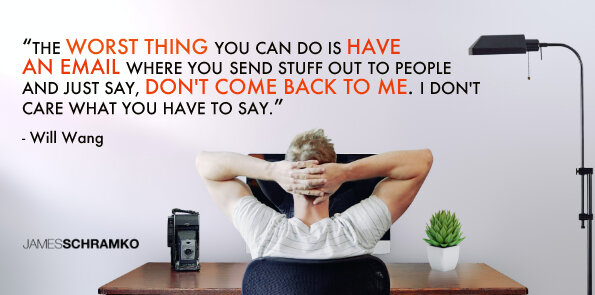
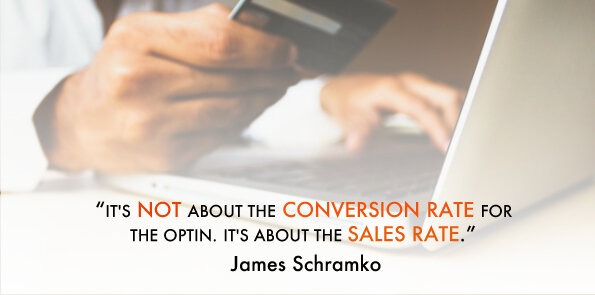
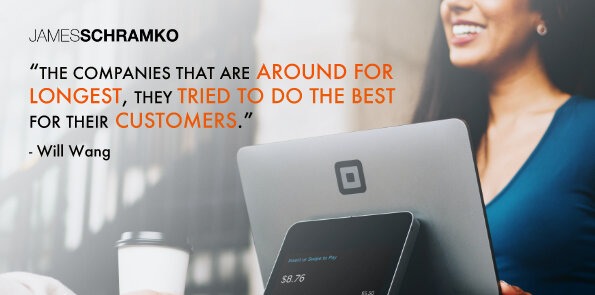
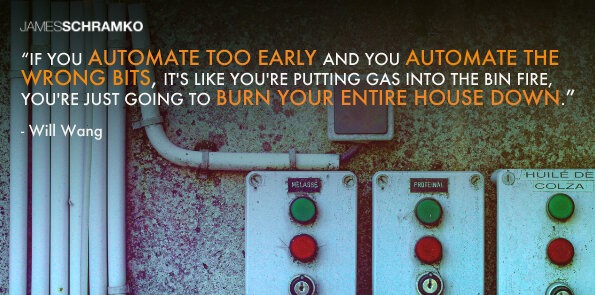



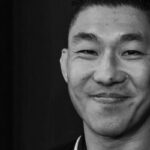





Leave a Reply